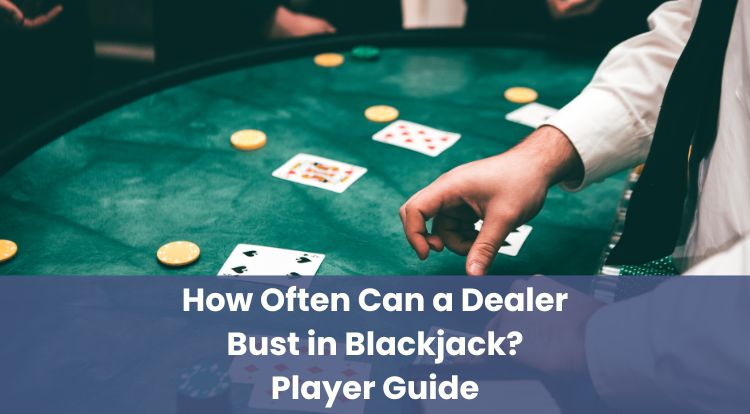
Some blackjack players wonder how often the dealer goes over 21. Understanding typical patterns can help clarify the flow of a round and why certain choices are made.
This blog post explains what a dealer bust means in practice, how frequently it occurs, how the upcard can influence outcomes, and what a bust means for each player at the table. Clear examples are also provided to make the concepts easy to follow.
Read on to learn more.
What Does It Mean When a Dealer Busts in Blackjack?
A dealer busts when the total value of their cards exceeds 21. At this point, the dealer’s hand is no longer valid and cannot win the round.
If the dealer busts, every player who still has a total of 21 or less wins that hand. Any player who exceeded 21 earlier has already lost, even if the dealer later busts. This is why players sometimes choose to stand on a moderate total rather than take another card, especially when the dealer appears to be under pressure.
With that in mind, it helps to know how often a bust actually happens and what influences those chances.
How Often Do Dealers Actually Bust in Blackjack?
Across common rule sets, dealers bust in approximately 28% of hands. The exact figure varies depending on house rules and the composition of the shoe. Rules requiring the dealer to hit on a soft 17 tend to reduce bust frequency slightly, while standing on a soft 17 tends to increase it. The number of decks and the frequency of shuffling also play a role, though usually minor.
The dealer’s visible card has the largest impact. Low upcards encourage the dealer to take more hits, increasing the likelihood of going over 21. High upcards generally lead to stronger finishing totals and fewer busts. We explore this further below.
Even when a bust occurs, each hand is decided independently, which leads to the next point.
Do All Players Win When the Dealer Busts?
No. Each hand is settled separately. A player who exceeds 21 before the dealer acts loses immediately and is out of that round. If the dealer later busts, that earlier result remains unchanged.
Here is a simple example with three players:
- Player A hits to 22 and busts. That bet is lost immediately.
- Player B stands on 18.
- Player C stands on 20.
If the dealer then draws to 23, both Player B and Player C win, while Player A’s earlier bust still stands as a loss.
This is why players pay close attention to the dealer’s upcard, which often indicates how the round might progress.
How Does the Dealer’s Upcard Change Bust Odds?
The upcard is the dealer’s face-up card and sets the tone for the round. Low cards, particularly 2 through 6, tend to present a challenge for the dealer. They often require multiple hits to reach at least 17, increasing the chances of exceeding 21. For example, with a 5 showing, the dealer’s bust rate is typically just over 40% under standard rules.
High upcards, such as 7 through ace, usually result in fewer busts. These cards allow the dealer to reach a standing total more easily without needing many additional cards. With an ace showing, the bust rate can drop to around the low teens because many two-card combinations quickly reach a suitable total.
Players often use these trends to guide their decisions. The aim is not to anticipate a bust but to consider the possibility of drawing another card against the likelihood that the dealer will finish strongly.
Can Players Predict When a Dealer Might Bust?
Players may estimate the chance of a dealer bust using probabilities but cannot foresee the outcome of a specific hand. Basic strategy—a mathematically derived set of actions that shows the statistically best move for every possible player hand versus every possible dealer upcard—is based on these probabilities, helping to guide decisions such as standing on a borderline total when the dealer shows a weak upcard or taking another card when the dealer’s upcard suggests a stronger finish.
Despite following strategy, uncertainty remains. The order of remaining cards, the number of decks in play, and how often the shoe is shuffled all influence results. In many online games, frequent shuffling means the shoe’s composition cannot be tracked between hands.
So, while the upcard and the rules provide useful information, there are no guarantees. The focus is on making consistent, informed decisions over time.
If you choose to play blackjack, always do so with responsible gambling practices in mind, and never wager more than you are willing to lose.
Play Casino Games Online
If you're looking to play casino games online—whether that's spinning the reels or joining a bingo room—you’ll find a range of options at Slots UK. Our site is fully licensed, and all games are independently tested to meet fairness standards.
We’ve made it straightforward to find the details that matter to you, from how deposits and withdrawals work to the rules of each game. You’ll also have access to a variety of tools designed to help you shape your time on the site in a way that suits you.
If you’re interested in playing casino games online, feel free to make an account at Slots UK, deposit some funds to play with, and take a look at what we have available at your own pace.
**The information provided in this blog is intended for educational purposes and should not be construed as betting advice or a guarantee of success. Always gamble responsibly.
